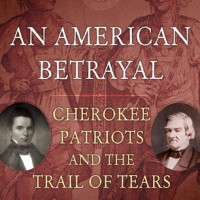Quick Lit Bits: 'An American Betrayal'
- Details
- Published on Friday, 10 February 2012 17:07
- Written by Kevin Kizer
An American Betrayal: Cherokee Patriots and the Trial of TearsBy Daniel Blake Smith
According to the book:
Though the tragedy of the Trail of Tears is widely recognized today, the pervasive effects of the tribe's uprooting have never been examined in detail. Despite the Cherokees' efforts to assimilate with the dominant white culture—running their own newspaper, ratifying a constitution based on that of the United States—they were never able to integrate fully with white men in the New World.
In An American Betrayal, Daniel Blake Smith's vivid prose brings to life a host of memorable characters: the veteran Indian-fighter Andrew Jackson, who adopted a young Indian boy into his home; Chief John Ross, only one-eighth Cherokee, who commanded the loyalty of most Cherokees because of his relentless effort to remain on their native soil; most dramatically, the dissenters in Cherokee country—especially Elias Boudinot and John Ridge, gifted young men who were educated in a New England academy but whose marriages to local white girls erupted in racial epithets, effigy burnings, and the closing of the school.
According to Kevin:
Chalk it up to mediocre history classes or crass representations in the media over the centuries, but many people may not realize that the Cherokee leadership at this time was hardly distinguishable physically from most Americans. Leaders like John and Major Ridge, John Ross, and Elias Boudinot were one-eighth Cherokee. And the Cherokee Chief himself, Ross, was a 5'7" Irish syphilitic. Most people never knew he was Cherokee by his looks. Which makes the resentment against the tribe all the more puzzling: they had begun assimilating themselves into the new American society, which is what was being demanded. Many had adapted from warrior/hunters (land roamers) to farmers (land settlers). They adopted the American form of government and even became Christians.
However, it was the obstinacy of President Andrew Jackson – fueled by his Southern constituency and those who just wanted to be rid of the Native Americans – that changed everything. The Supreme Court ruled that states could not pass laws relating to the Cherokees because they had been declared a sovereign nation. That made it a federal issue. Jackson's response? He would not enforce the ruling, saying, "this decision (was) made by a few superannuated life estate judges."
The Cherokees faced two options: stay and have no protection from encroaching, unimpeded, violent settlers or uproot their tribe and head to the "American desert", a.k.a. Arkansas and Oklahoma. Part of the tribe stayed back with Chief Ross until the bitter end. But a large group, led by Boudinot and the Ridges, left immediately and had a relatively safe journey westward. Somewhat surprisingly, once the Chief Ross and the others were physically forced to move west and were reunited with the rest of the nation is when things fell apart completely for the Cherokees.
This book provides interesting new insights and facts about this well-known tragedy in American history, which makes the anti-Native American sentiment prevalent in that era even more baffling to readers today.


















































